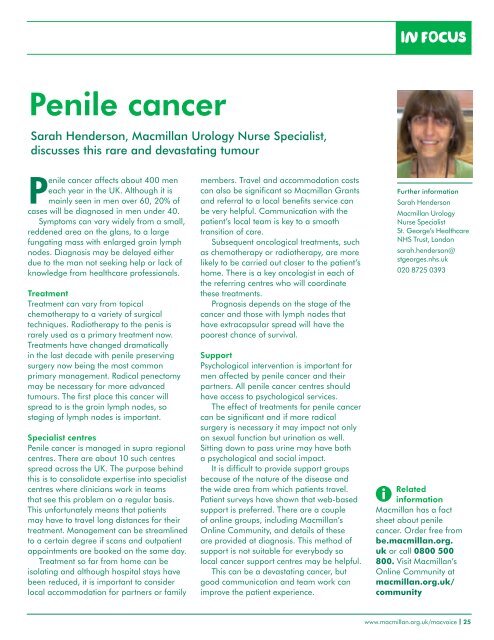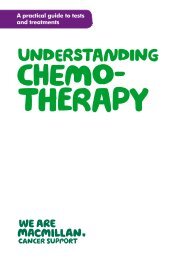Download PDF here - Macmillan Cancer Support
Download PDF here - Macmillan Cancer Support
Download PDF here - Macmillan Cancer Support
- No tags were found...
Create successful ePaper yourself
Turn your PDF publications into a flip-book with our unique Google optimized e-Paper software.
Penile cancerSarah Henderson, <strong>Macmillan</strong> Urology Nurse Specialist,discusses this rare and devastating tumourPenile cancer affects about 400 meneach year in the UK. Although it ismainly seen in men over 60, 20% ofcases will be diagnosed in men under 40.Symptoms can vary widely from a small,reddened area on the glans, to a largefungating mass with enlarged groin lymphnodes. Diagnosis may be delayed eitherdue to the man not seeking help or lack ofknowledge from healthcare professionals.TreatmentTreatment can vary from topicalchemotherapy to a variety of surgicaltechniques. Radiotherapy to the penis israrely used as a primary treatment now.Treatments have changed dramaticallyin the last decade with penile preservingsurgery now being the most commonprimary management. Radical penectomymay be necessary for more advancedtumours. The first place this cancer willspread to is the groin lymph nodes, sostaging of lymph nodes is important.Specialist centresPenile cancer is managed in supra regionalcentres. T<strong>here</strong> are about 10 such centresspread across the UK. The purpose behindthis is to consolidate expertise into specialistcentres w<strong>here</strong> clinicians work in teamsthat see this problem on a regular basis.This unfortunately means that patientsmay have to travel long distances for theirtreatment. Management can be streamlinedto a certain degree if scans and outpatientappointments are booked on the same day.Treatment so far from home can beisolating and although hospital stays havebeen reduced, it is important to considerlocal accommodation for partners or familymembers. Travel and accommodation costscan also be significant so <strong>Macmillan</strong> Grantsand referral to a local benefits service canbe very helpful. Communication with thepatient’s local team is key to a smoothtransition of care.Subsequent oncological treatments, suchas chemotherapy or radiotherapy, are morelikely to be carried out closer to the patient’shome. T<strong>here</strong> is a key oncologist in each ofthe referring centres who will coordinatethese treatments.Prognosis depends on the stage of thecancer and those with lymph nodes thathave extracapsular spread will have thepoorest chance of survival.<strong>Support</strong>Psychological intervention is important formen affected by penile cancer and theirpartners. All penile cancer centres shouldhave access to psychological services.The effect of treatments for penile cancercan be significant and if more radicalsurgery is necessary it may impact not onlyon sexual function but urination as well.Sitting down to pass urine may have botha psychological and social impact.It is difficult to provide support groupsbecause of the nature of the disease andthe wide area from which patients travel.Patient surveys have shown that web-basedsupport is preferred. T<strong>here</strong> are a coupleof online groups, including <strong>Macmillan</strong>’sOnline Community, and details of theseare provided at diagnosis. This method ofsupport is not suitable for everybody solocal cancer support centres may be helpful.This can be a devastating cancer, butgood communication and team work canimprove the patient experience.Further informationSarah Henderson<strong>Macmillan</strong> UrologyNurse SpecialistSt. George’s HealthcareNHS Trust, Londonsarah.henderson@stgeorges.nhs.uk020 8725 0393Relatedinformation<strong>Macmillan</strong> has a factsheet about penilecancer. Order free frombe.macmillan.org.uk or call 0800 500800. Visit <strong>Macmillan</strong>’sOnline Community atmacmillan.org.uk/communitywww.macmillan.org.uk/macvoice 25
















